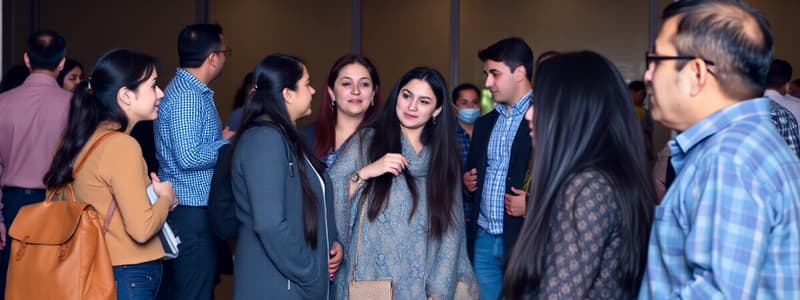Podcast
Questions and Answers
What defines a primary group?
What defines a primary group?
- A group characterized by temporary interactions.
- A perceptual grouping of individuals without established connections.
- A small, long-term group with solid relationships. (correct)
- A large aggregation of individuals with minimal interaction.
How do groups' boundaries influence membership?
How do groups' boundaries influence membership?
- They strictly define who is part of the group and who is not. (correct)
- They only apply to planned groups, not emergent groups.
- They limit the potential size of the group.
- They have no real impact on who joins a group.
Which type of group is characterized by similarities in actions and outlook?
Which type of group is characterized by similarities in actions and outlook?
- Social group
- Collective (correct)
- Category
- Primary group
What does the social brain hypothesis suggest about humans?
What does the social brain hypothesis suggest about humans?
Which interaction type distinguishes between task and relationship interactions?
Which interaction type distinguishes between task and relationship interactions?
What is group cohesiveness?
What is group cohesiveness?
Which of the following is not a goal sought by groups as specified by McGrath?
Which of the following is not a goal sought by groups as specified by McGrath?
What characterizes planned groups as opposed to emergent groups?
What characterizes planned groups as opposed to emergent groups?
What does entitativity refer to in group dynamics?
What does entitativity refer to in group dynamics?
Which stage of group development is characterized by dissatisfaction and cliques forming?
Which stage of group development is characterized by dissatisfaction and cliques forming?
What is meant by 'norming' in Tuckman's theory of group development?
What is meant by 'norming' in Tuckman's theory of group development?
Which of the following describes the performance stage of group development?
Which of the following describes the performance stage of group development?
What does the study of group dynamics help us understand?
What does the study of group dynamics help us understand?
Which process reflects the need to belong and affiliate with groups?
Which process reflects the need to belong and affiliate with groups?
What stage involves departures and decreased dependence among group members?
What stage involves departures and decreased dependence among group members?
Which of the following is NOT a contextual factor influencing group formation?
Which of the following is NOT a contextual factor influencing group formation?
Flashcards are hidden until you start studying
Study Notes
What is a Group
- A group is made up of at least two individuals connected via social relationships.
Group Types
- Primary Groups: Small, long-term groups with frequent interaction, strong solidarity, and high interdependence. They significantly influence members' values, attitudes, and social outcomes.
- Social Groups: Groups with a smaller number of individuals who interact frequently for extended periods (e.g., work groups, clubs).
- Collectives: Large gatherings of people with similar actions and outlooks (e.g., crowds, queues).
- Categories: Perceived groupings of people based on assumed similarities (e.g., women, elderly, college students).
Characteristics of Groups
- Composition: Individuals within a group contribute to its nature.
- Boundaries: Group boundaries classify who is a member and who isn't.
- Size: The number of relationships exponentially increases with greater group size.
- Interaction: Interaction involves task-related communication and relationship-building.
- Interdependence: Groups create dependencies among members, either one-sided or mutual.
- Structure: Group interaction is patterned by norms, roles, and interpersonal relationships.
- Goals: Groups have varying goals (e.g., generating ideas, making decisions, executing tasks).
- Origin: Groups can be "planned" (deliberately formed) or "emergent" (forming gradually over time).
- Unity: Group cohesion or cohesiveness refers to the group's unity.
- Entitativity: Entitativity refers to the perceived "groupness" of an aggregation.
Group Dynamics
- "Dynamic" comes from "dynamikos," meaning powerful and energetic.
- Formative Processes: Include the human need to belong, factors promoting group formation, and development of group cohesion.
- Influence Processes: Involve aspects of group structure (norms, roles, relationships), conformity, power dynamics, and leadership.
- Performance Processes: Include group productivity, motivation, teamwork, and collaborative decision-making.
- Conflict Processes: Cover intragroup conflict (within a group) and intergroup conflict (between groups).
- Contextual Processes: Depend on group settings and specific purpose.
Stages of Group Development (Tuckman's Theory)
- Orientation (Forming): Exchange of personal information, uncertainty, tentative communication.
- Conflict (Storming): Disagreements, challenges to leadership and procedures, clique formation.
- Structure (Norming): Cohesiveness, agreement on procedures, standards, and roles, improved communication.
- Performance (Performing): Focus on task completion, cooperation, and decision-making.
- Dissolution (Adjourning): Departures, reduced dependence, potential regret.
Understanding the Social World
- The study of groups and their dynamics is vital to comprehending individuals, organizations, communities, and society as a whole.
- Groups are the building blocks connecting individuals to society.
- Societies, regardless of their type, are shaped by the groups within them.
Studying That Suits You
Use AI to generate personalized quizzes and flashcards to suit your learning preferences.




